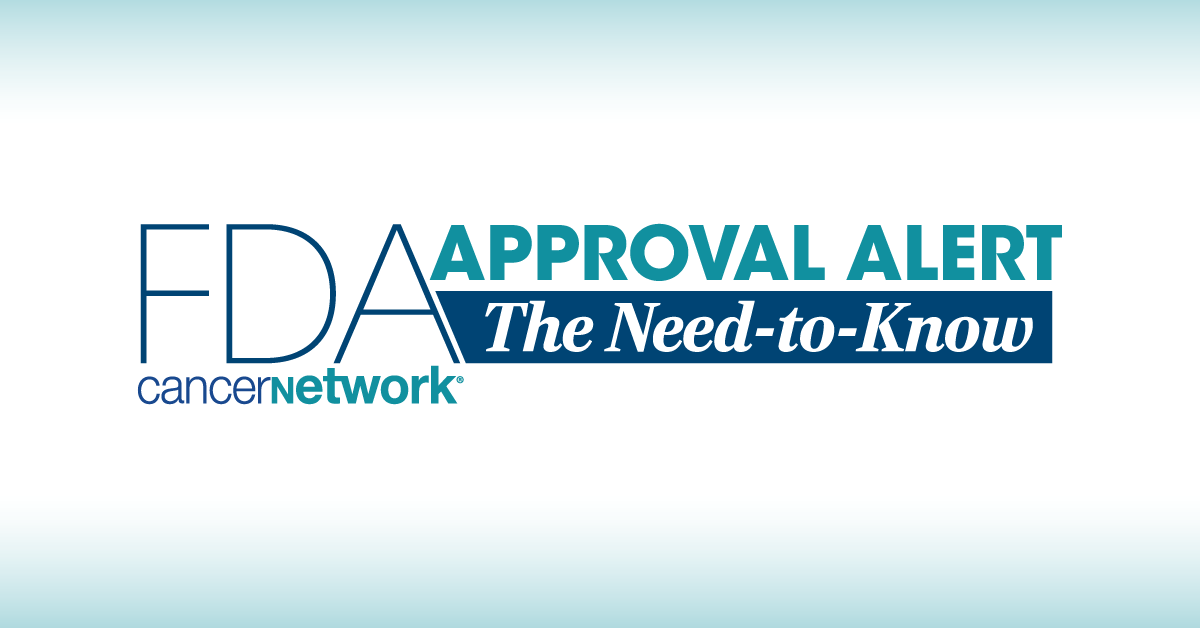FDA Approves Liso-cel in Relapsed/Refractory Mantle Cell Lymphoma
Findings from the TRANSCEND NHL 001 trial support the FDA approval of lisocabtagene maraleucel in relapsed/refractory mantle cell lymphoma.
Liso-cel received accelerated approval from the FDA as a treatment for patients with relapsed/refractory follicular lymphoma in May 2024 based on data from the phase 2 TRANSCEND-FL trial (NCT04245839).

The FDA has granted approval to lisocabtagene maraleucel (liso-cel; Breyanzi) as a treatment for patients with relapsed/refractory mantle cell lymphoma (MCL), according to a press release from the developers, Bristol Myers Squibb.1
Supporting data for the approval in this indication came from the MCL cohort of the phase 1 TRANSCEND NHL 001 trial (NCT02631044).
Topline data showed that 85.3% (95% CI, 74.6%-92.7%) of patients responded to treatment with liso-cel; the complete response (CR) rate was 67.6% (95% CI, 55.2%-78.5%). Additionally, the median duration of response (DOR) was 13.3 months (95% CI, 6.0-23.3), and the median time to response was 1 month (0.7-3.0).
“There have been few advances in the treatment of relapsed or refractory MCL, and prognosis worsens for patients after each subsequent relapse, often leaving them with high disease burden and difficulty achieving deep and durable responses,” Michael Wang, MD, lead investigator and Puddin Clarke Endowed Professor, Department of Lymphoma and Myeloma, Division of Cancer Medicine at The University of Texas MD Anderson Cancer Center, said in the press release.1 “The approval of [liso-cel] offers an important new CAR T treatment option with high rates of lasting responses and a consistent safety profile, which is critically important for these patients who currently have limited options to treat this aggressive disease.”
According to findings published in the Journal of Clinical Oncology, the objective response rate (ORR) with liso-cel was 83.1% (95% CI, 73.3%-90.5%) among 83 evaluable patients in the efficacy set, which included a CR rate of 72.3% (95% CI, 61.4%-81.6%).2 Response rates were comparable across different patient subgroups, including those with TP53 mutations, secondary central nervous system (CNS) lymphoma, or blastoid morphology.
With a median follow-up of 22.8 months (95% CI, 16.7%-23.0%), the median DOR was 15.7 months (95% CI, 6.2-24.0). Treatment yielded a median progression-free survival (PFS) of 15.3 months (95% CI, 6.6-24.9) and a median overall survival (OS) of 18.2 months (95% CI, 12.9-36.3). Among those who had a CR, the median OS was 36.3 months (95% CI, 15.7-not reached [NR]).
“The current study expands knowledge about CAR T-cell therapy and the clinical landscape of [relapsed/refractory] MCL in patients with aggressive disease and high-risk features, including those with older age and moderate comorbidities. These results support liso-cel as a potential new treatment option for [relapsed/refractory] MCL, particularly in patients for whom limited therapies are available,” the study authors wrote.2
In the open-label, multicenter TRANSCEND NHL 001 trial, patients with MCL underwent leukapheresis prior to liso-cel infusion at a target dose of 50 x 106 CAR-positive T cells or 100 x 106 CAR-positive T cells.
The trial’s primary end points were adverse effects (AEs), dose-limiting toxicities, and ORR based on independent review committee assessment using Lugano criteria. Secondary end points included CR rate, DOR, PFS, OS, and health-related quality of life.
Patients 18 years and older with PET-positive MCL based on Lugano 2014 guidelines were eligible for enrollment on the trial. Additional eligibility criteria included having relapsed/refractory disease following 2 or more prior lines of therapy including a Bruton tyrosine kinase (BTK) inhibitor, an alkylating agent, and an anti-CD20 agent.
The median patient age in the MCL cohort was 68.5 years (range, 36-86), and most patients were male (76%). Additionally, most of the cohort was White (87.5%), not Hispanic (92%), had an ECOG performance status of 0 (55%), no TP53 mutation (39%), no blastoid morphology (55%), and no complex karyotype (40%). Prior BTK inhibitors in this patient population included ibrutinib (Imbruvica; 74%) and acalabrutinib (Calquence; 33%).
Any-grade treatment-emergent AEs (TEAEs) affected 100% of patients who received liso-cel, which commonly included cytokine release syndrome (61%), neutropenia (59%), anemia (44%), fatigue (35%), and thrombocytopenia (30%). Grade 3 or higher TEAEs occurred in 86% of patients and included neutropenia (56%), anemia (37.5%), and thrombocytopenia (25%).
Grade 3 or higher infections affected 15% of patients, and prolonged cytopenias were reported in 40%. Grade 5 TEAEs occurred in 5% (n = 4) of patients, with 3 of these toxicities determined to be related to treatment with liso-cel.
The FDA previously granted priority review to liso-cel as a treatment for patients with relapsed/refractory MCL in January 2024.3 The priority review designation for the supplemental biologics license application was based on findings from the TRANSCEND NHL 001 trial.
Liso-cel received accelerated approval from the FDA as a treatment for patients with relapsed/refractory follicular lymphoma in May 2024 based on data from the phase 2 TRANSCEND-FL trial (NCT04245839).4
References
- U.S. Food and Drug Administration approves Bristol Myers Squibb’s Breyanzi as a new CAR T cell therapy for relapsed or refractory mantle cell lymphoma. News release. Bristol Myers Squibb. May 30, 2024. Accessed May 30, 2024. https://tinyurl.com/43h4juen
- Wang M, Siddiqi T, Gordon LI, et al. Lisocabtagene maraleucel in relapsed/refractory mantle cell lymphoma: primary analysis of the mantle cell lymphoma cohort from TRANSCEND NHL 001, a phase I multicenter seamless design study. J Clin Oncol. 2023;42(10):1146-1167. doi:10.1200/JCO.23.02214
- Regulatory applications accepted in the U.S. and Japan for Bristol Myers Squibb’s Breyanzi (lisocabtagene maraleucel) in relapsed or refractory follicular lymphoma (FL) and relapsed or refractory mantle cell lymphoma (MCL). News release. Bristol Myers Squibb. January 30, 2024. Accessed May 16, 2024. http://tinyurl.com/mu6zd678
- FDA grants accelerated approval to lisocabtagene maraleucel for follicular lymphoma. News release. FDA. May 15, 2024. Accessed May 16, 2024. https://tinyurl.com/euust4sa
Highlighting Insights From the Marginal Zone Lymphoma Workshop
Clinicians outline the significance of the MZL Workshop, where a gathering of international experts in the field discussed updates in the disease state.